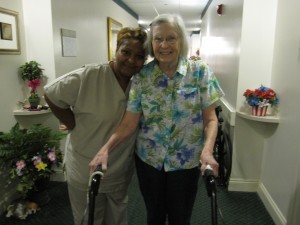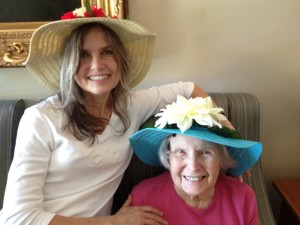November is the month to honor caregivers: Start by thanking a Certified Nursing Assistant
While there is endless information these days encouraging us caregivers to take care of ourselves, improve our abilities through education, and receive support by connecting with other caregivers, let me remind you of the people we hire to help take care of our loved ones.
When the job of caring became too much for me to do alone, I turned to others for help. That came in the form of hiring strangers to entrust my mother’s care. We started by having someone come into my mother’s home to prepare the noonday meal and provide some social interaction. Although this arrangement only lasted two weeks, I have to say this young lady did what I asked of her even though my mother wasn’t so keen on having her in the house. Not an easy job when the person you are there to serve doesn’t understand the need or resents your presence.
Very shortly after that, we moved Momma into an assisted living facility, where she had the help of Certified Nursing Assistants (CNA’s) to assist her with dressing and bathing. I came to appreciate the confidence these (mostly female) workers had as they worked tirelessly all day long, going from one person to the next, to carry out their duties. Some CNA’s seemed to enjoy their job more than others, some with genuine care and kindness, some just doing their job. However, they all kept going, regardless of family or health problems or financial needs that was affecting their mood. Do I think that two weeks is a long enough time to be trained as an expert on giving care, especially to someone with dementia? No. Most of the learned care techniques are gained from each other while on the job. So given the job qualifications required, the tasks to achieve on a daily basis are not easy. After all, we needed help, too.
I’ve called the CNA’s our “friends” as I’ve explained their involvement to my mother. We’ve taken their pictures and framed them along with their name underneath to remind us of how important they are to us. We had to move into a Special Care Unit for a while and benefited from the new CNA’s we met there and their willingness to learn my mom’s habits and behaviors. I have always tried to find ways to thank and encourage the work they do and report to their supervisor their diligence and good deeds.
Recently, I was considering broken communication between a CNA and myself. Instead of complaining, I decided to thank the entire unit for all their help by bringing in lunch for the day shift and dinner for the night shift. If the pizza didn’t do it, maybe the Mississippi mud cake would bridge any gaps that had developed over the six months we’d been there. While I have perceived that family members are viewed as potential trouble for the CNA’s, I feel these women need to hear what a good job they are doing and give them opportunity to take pride in their work. They take the brunt of all complaints and expect to either hear it from the family, or worse, be reprimanded by their supervisor. While this is appropriate at times, we need to know how to get along without fear of reprisal.
I hope we can change our perception of each other and be willing to work together for the good of the residents. The care of our loved ones requires a harmonious team. While we as family members might find that good care is hard to sustain, it’s is all our responsibility to improve communication and learn together. Let’s start by thanking a CNA today.





Recent Comments